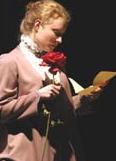SEARCH CurtainUp
REVIEWS
FEATURES
NEWS
Etcetera and
Short Term Listings
LISTINGS
Broadway
Off-Broadway
BOOKS and CDs
OTHER PLACES
Berkshires
London
LA/San Diego
Philadelphia
Elsewhere
QUOTES
On TKTS
LETTERS TO EDITOR
FILM
LINKS
MISCELANEOUS
Free Updates
Masthead
NYC Weather
Doña Rosita the Spinster
|
Does it seem right to you for a man to go off and leave for fifteen years a woman who's the cream on the butter. She ought to get married. My hands are aching from putting away tableclothes of Marseilles lace, ambroidered bed-sets, tablemats and gauze bedstreds with embossed flowers. She ought to be using them, wearing them out, but she doesn't seem to realize that time is passing. She'll have hair like silver and she'll still be sewing satin bands on the ruffles of her honeymoon nightdress. ---the Housekeeper |

Amanda Jones as Dona Rosita the Spinster
(Photo: John Frachiseur) |
Doña Rosita premiered in 1935 but the idea germinated in Lorca's mind much longer, beginning in 1924 with a friend's account of the "rosa mutabile," a rose that changed color from red to white that he'd found in a 17th-century rose book. The narrative Lorca built on this botanical foundation (bolstered by his own extensive research), drew an impossible to miss symbolic parallel between a delicate horticultural species and a human one. Besides its spinster heroine, a type Lorca knew well and appreciated greatly, the play features characters based on people he knew; for example a maid in his own childhood home and one of his grade school teacher, served as models for the housekeeper and Don Martin).
While the play's blend of humor and Chekhovian melancholy, dialogue and poetry makes for a varied tone, the story itself unfolds in a straightforward manner (as directed here, too much so) and without so much as a smidgen of suspense. You know from her first entrance, that Doña Rosita, the ward of an aunt (Elise Stone) and uncle (Craig Smith) who adore her, is going to be the victim of her illusions about her fiance (Danaher Dempsey), the son of the aunt's brother who has left Granada for New World opportunities. When the young man's father demands that his son join him, it goes without saying that he will neither return or ask Doña Rosita to join him. The doting aunt and uncle and the outspoken family housekeeper watch helplessly as the young woman turns pale and inward, like a rose shedding its petals. Fifteen years pass by between the first and second acts, another ten by the time we arrive at the third.
The now obsolete stigma of spinsterhood makes Doña Rosita something of an artifact, but director Johns and adapter Gwynne Edwards have done solid work in recreating the atmosphere and flavor of the middle- class Granada household in which the spinster clings to her unrealistic hopes. The sizeable ensemble is headed by Cocteau regulars Elise Stone and Craig Smith who acquit themselves well as the aunt and uncle; Eileen Glenn who wrings every ounze of humor from the role of the meddling Housekeeper; Michael Surabian who does double duty as the amusing Mr. X, and Don Martin, the school teacher whose life of regrets is something of a male counterpart to that of Dona Rosa.
Some of the actors, especially Ms. Glenn, seem to be trying out a variety of accents which without Roman Tatarowicz's distinctly Spanish set, Margaret McKowen's authentic costumes (including an appropriately dusky rose dress for Ms. Jones) and Charles Berigan's music could leave you wondering where in the world you are. In the final analysis, it's Ms. Jones who anchors the play both in appearance, line delivery and delicacy of emotions expressed. Unlike some of her previous Cocteau appearances opposite Jason Crowl (another promising newer company perfomer), she doesn't have much chance to interact with her romantic opposite. In fact, Donaher Dempsey has so little to do as her errant and not particularly charismatic lover that he's been given a second role as a workman.
Lorca's intentions for Doãa Rosita was to "create a simple, friendly comedy." However, while the first two acts are indeed simple and almost farcical, the chief rewards of this production derive from its poetry and the tragic third act.
Until February, Doãa Rosita performs in repertory with Lysistrata/Aristophanes. For a review of the National Asion Actor Theater Company's outstanding production of Lorca's best known and most popular play, The House of Bernarda Alba go here and watch our front page for the posting about another upcoming production of that work. To read reviews of Ms. Jones' other Cocteau performances, see The Importance of Being Earnest and Uncle Vanya.
| Doãa Rosita the Spinster
Written by Federico Garcia Lorca Adaptation by Gwynne Edwards Directed by Ernest Johns Assist. Director: Amanda Kadrmas Cast:Natalie Ballesteros, Danaher Dempsey, Eileen Glenn, Amanda Jones, Marlene May, Sara Mayer, Timothy McDonough, Carolyn Rattaray, Craig Smith, Elise Stone, Michael Surabian, Amy Lee Williams Set Design: Roman Tatarowicz Original Music & Sound Design: Charles Berigan Costumes: Margaret McKowen Dramaturg: Rachel Macklin Running time: 2 hours, includes 2 intermissions Jean Cocteau at the Bouwerie Lane Theatre, 330 Bowery (Bond/East 2nd Street), 212/677-0060 or www.jeancocteaurep.org . 12/19/03 to 5/04/04; opening 1/15/04. Reviewed by Elyse Sommer based on January 11th performance |


Mendes at the Donmar
Our Review

At This Theater

Leonard Maltin's 2003 Movie and Video Guide

Ridiculous!The Theatrical Life & Times of Charles Ludlam

Somewhere For Me, a Biography of Richard Rodgers

The New York Times Book of Broadway: On the Aisle for the Unforgettable Plays of the Last Century

6, 500 Comparative Phrases including 800 Shakespearean Metaphors by CurtainUp's editor.
Click image to buy.
Go here for details and larger image.


